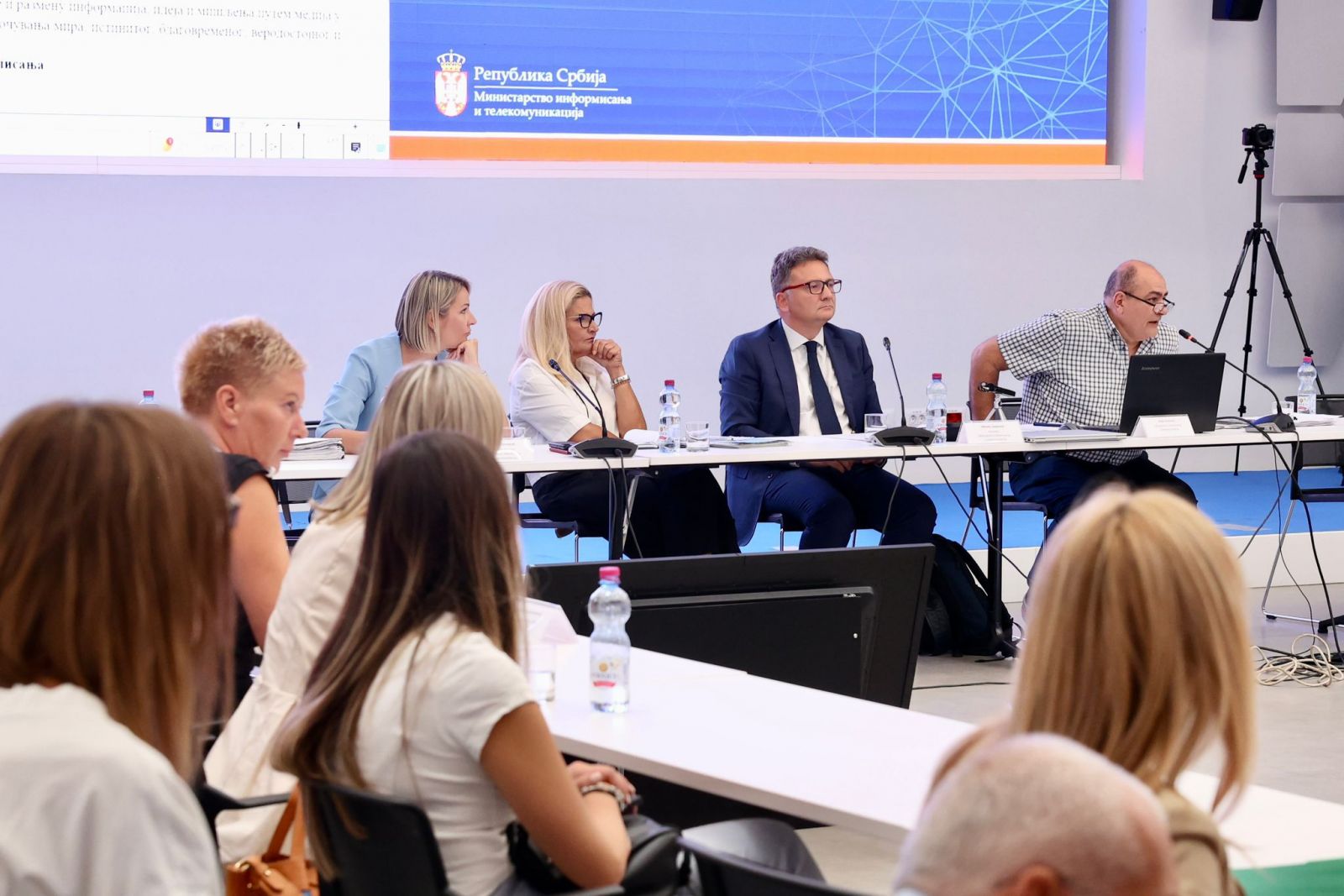
The Ministry of Information and Telecommunications held today the first round table in Belgrade as part of the public debate on the Draft Law on Public Information and Media and the Draft Law on Electronic Media. Minister of Information and Telecommunications Mihailo Jovanović and Minister of European Integration Tanja Miščević also took part in the round table.
At the beginning of the round table, Minister Jovanović emphasised the importance of these two draft laws, which were written in accordance with the Strategy for the Development of the Public Information System in the Republic of Serbia for the 2020–2025 period.
“We worked very dedicatedly on the draft proposals of these two laws, thoroughly, trying to take into account every opinion that could be relevant in order to get the best possible legal solutions. We could not have done this great work without the support of journalist and media associations, and I would like to use this opportunity to thank them for their contribution. We also owe a great deal of gratitude to our international partners: the Delegation of the European Union, the OSCE Mission to Serbia, the Embassy of the Kingdom of Norway and the Konrad Adenauer Foundation, who were involved in the law drafting process in every possible way from the first day to the last,” said Minister Jovanović and invited all interested parties, the expert public, non-governmental organisations, representatives of the public administration and all individuals to join the public discussion.
“As the line minister, I guarantee that every proposal that can improve the proposed drafts of the Law on Public Information and the Law on Electronic Media will be accepted. The importance of media legislation that is capable of responding to all the challenges we face cannot be overemphasised. Such laws are the foundation of free and responsible journalism, the protection of citizens’ rights and the preservation of democratic values. “Without strong and fair media legislation, we cannot continue to improve the media scene in Serbia,” Jovanović emphasised.
The Draft Law on Public Information and Media, among other things, more fully defines the public interest in the field of public information and more closely regulates the work of media publishers whose founders are national councils of national minorities, and the detailed procedure for project co-financing. The establishment of a Single Information System for the implementation and monitoring of the co-financing of projects in the field of public information is also envisaged, which will greatly affect the transparency of this process. In addition to the existing Media Register, the draft law also establishes the Register of Media Content Producers.
The Draft Law on Public Information and Media also provides labour law protection to journalists, in accordance with regulations in the field of labour law, which strengthens the basis for the protection of professional journalistic integrity from abuse of law and harassment, in order to prevent freedom of public information.
The Draft Law on Electronic Media, in addition to the harmonisation with the revised Directive on Audiovisual Media Services from 2018 and the fulfilment of pre-accession obligations from Chapter 10, creates prerequisites for achieving greater independence and professionalism of the Regulatory Body for Electronic Media (REM), and thus better regulation of the electronic media market.
In the text of the Draft Law on Electronic Media, the organisational, functional and financial independence of the Regulatory Body for Electronic Media was strengthened, its professionalism improved, as well as its responsibility towards the public. New bodies were established: The Council – the decision-making body, and the director – the representative body, as well as specific clear criteria for the selection of Council members, which are much stricter compared to the current law. It is also important to note that the authorised proposers for the members of the Council of Regulators have been changed (instead of the previous parliamentary committees, the proposal is for them to be the Commissioner for Equality, the Ombudsman and associations of electronic media publishers); the period of office is limited to six years and re-election is not allowed.
Also, in the Draft Law on Electronic Media special attention was given to the protection of minors by regulating content that can seriously harm the development of minors, time limits for inappropriate content, as well as their presence in programme content. Reality programme is defined, what is an unsuitable reality programme for minors and what is forbidden to be shown in a reality programme is prescribed. Sanctions for non-compliance with provisions related to the protection of minors have also been made stricter.
Round tables within the public debate on the Draft Law on Public Information and Media and the Draft Law on Electronic Media will be organised in the form of presentations and discussions in three more cities: on 20 September in Niš (11 a.m., Oficirski dom, address: Orlovića Pavla BB), on 27 September in Novi Sad (11 a.m., City Assembly of Novi Sad, Great Hall on the 1st floor, address: Žarka Zrenjanina 2, entrance III) and on 4 October in Kragujevac (11 a.m., City Administration Building, Assembly Hall, address: Trg slobode 3).
Source: Ministry of Information and Telecommunications








